Jun 2013
Jun 2013 sadmin
More jobs for SA’s youth
More jobs for SA’s youth sadminLucas Mokone may not have a regular job but the 32-year-old from Orange Farm, Gauteng, is passionate about what he wants to do.
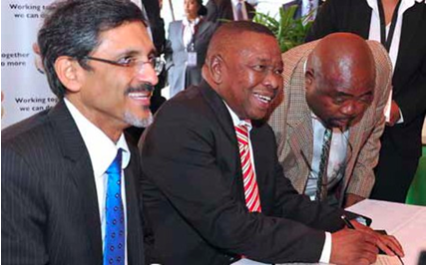 I want to be a firefighter,” he said, clutching a bag of brochures and leaflets he obtained at the signing at the Hector Pieterson Museum in Orlando West.
I want to be a firefighter,” he said, clutching a bag of brochures and leaflets he obtained at the signing at the Hector Pieterson Museum in Orlando West.
For young people like Mokone, the accord, which was signed recently, holds the promise of a better future, outlining time lines and steps to be taken to get South Africa’s youth working.
Mokone has been looking for a job since he finished school in 2005 without much luck.
He is currently a volunteer at the Emergency Management Services in Johannesburg.
He has done a basic Microsoft computer course, completed firefighting courses like Firefighter 1 and Hazmatt and has a public drivers permit but remains unemployed.
The National Youth Service Programme pays him a stipend for the volunteer work he does as a public educator, driver and firefighter.
“The money is just enough for transport and food,” he said.
Mokone was one of the scores of youth who witnessed government ministers, trade union officials and leaders of youth formations sign the Youth Employment Accord.
As part of this new plan, government departments will have to increase their intake of interns so that they equal 5 per cent of total employment.
This is to help youth gain the experience often required for employment in the private and public sectors.
State-owned companies will also have to recruit more students from universities and further education and training colleges, who require work experience to complete their studies.
The ultimate aim is to create 5 million new jobs by 2020. This will be achieved by:
- Improving and providing training opportunities for school leavers.
- Connecting young people to job opportunities.
- Increasing the number of young people employed in government entities.
- Setting targets for the employment of youth in the infrastructure programme, renewable energy (installing solar water heaters) and business process services (call centres).
- Getting the Small Enterprise Finance Agency (Sefa), Small Enterprise Development Agency (Seda) and the Jobs Fund to dedicate more resources to young people who want to set up businesses.
- Giving the private sector incentives for employing more young people.
Speaking at the launch of the accord, Deputy President Kgalema Motlanthe hailed the agreement as a major breakthrough in government’s drive to empower the youth.
A common understanding among the partners, said Deputy President Motlanthe, is that “more jobs need to be created to en- sure that the total number of South Africans employed is significantly stepped up”.
He emphasised that young people would get jobs, not by replacing existing workers, but through an increase in the total number of employed South Africans.
Minister of Economic Development Ebrahim Patel said concrete measures to implement the accord would be announced in the coming months.
President of the Congress of South African Trade Unions (Cosatu) Sdumo Dlamini welcomed the accord, pointing out that the youth make up 63 per cent of the unemployed in South Africa.
Thero Setiloane, the CEO of Business Leadership South Africa, which comprises 84 of the largest businesses operating in the country, said business supported the initiative and would soon announce concrete initiatives to increase the intake of young employees.
Deputy President Motlanthe also announced that the Industrial Development Corporation had set aside R1 billion of its Gro-E funding scheme to provide loans at low interest rates to youth-owned or youth-focused businesses in the next three years.
The Motsepe Foundation pledged R100 million over three years for youth enterprises and a further R100 million for skills development.
Professional services company KPMG is part of the private sector Harambee programme that will place 3 000 young people in entry-level work by the middle of this year, with a target of 10 000 by the end of 2014.
Mokone expressed hope that the accord would help him realise his dream. “Hopefully the accord will make it easier for me to get money to further my studies and get a job,” he said.
President Zuma broadens ties with neighbours, friends of SA
President Zuma broadens ties with neighbours, friends of SA sadminPresident Jacob Zuma has travelled to several African countries recently to encourage peace and strengthen relations between South Africa and its neighbours.
The visits are part of ongoing efforts to cultivate peace and stimulate economic prosperity on the African continent.
President Zuma has championed the African agenda at all international forums, including the United Nations and during gatherings of the BRICS (Brazil, Russia, India, China and South Africa) bloc of countries.
High on his agenda was the restoration of peace and democracy to the Central African Republic, where 13 South Africans soldiers were killed during a coup.
The President attended the Extraordinary Summit of the Economic Community of Central African States in Chad, which discussed ways of restoring democratic rule to the country.
Relations with Nigeria also look set to improve following the President’s visit to that country.
President Zuma met his Nigerian counterpart President Goodluck Jonathan to discuss bilateral, regional, continental and international relations.
The two leaders also signed a number of agreements that are expected to benefit both countries.
On a visit to Algeria, the President discussed ways of strengthening cooperation in areas of trade, security and energy infrastructure with President Abdelaziz Bouteflika.
Meanwhile, the industrialisation of Southern Africa was a key item on the agenda when President Zuma attended the Southern African Customs Union Summit in Gaborone, Botswana.
The President was also in attendance when Uhuru Kenyatta was inaugurated as the new President of Kenya.
South Africa has used various forums to pro- mote peace and security in Africa as it makes the continent central to its foreign policy. This means that President Zuma will continue to visit many African countries to strengthen relations, promote peace and prosperity on the continent.
Bridge set to connect rural E Cape communities
Bridge set to connect rural E Cape communities sadminInfrastructure
The lives of villagers from Mvezo and Lundondolo in the Eastern Cape will never be the same, once the Nkosi Dalibhungu Mandela Legacy Bridge is completed.
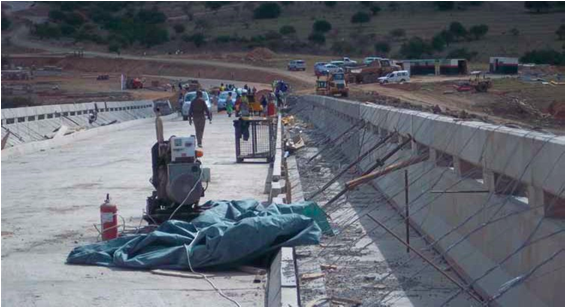 When finished, the bridge will connect the village of Mvezo - the birthplace of former President Nelson Mandela - in the King Sabata Dalindyebo Municipality to the Lundondolo village on the other side of the Mbhashe River.
When finished, the bridge will connect the village of Mvezo - the birthplace of former President Nelson Mandela - in the King Sabata Dalindyebo Municipality to the Lundondolo village on the other side of the Mbhashe River.
It will also link up to the new 10 kilometre tarred road that will connect Mvezo with the N2, reducing the distance between this area and East London, Mthatha and Idutywa by more than 50 kilometres.
When the Minister of Rural Development and Land Reform, Gugile Nkwinti, visited the area in April to monitor the progress of the bridge, he was happy to find that it was on the verge of completion.
Built by local contractors, the 140-metre long bridge is situated on the Mbhashe River of the Mbhashe Local Municipality in the former Transkei.
Minister Nkwinti initiated the project in 2010, to improve the lives of the people of Mvezo and Lundondolo, who had to travel several hours to get to town in Idutywa.
The historical village of Mvezo will now act as a catalyst for economic activities and improve access to services including electricity, water, flush toilets, roads, entertainment, sport centres, shopping centres, schools and agricultural production.
The entire project has cost more than R120 million. The bridge is scheduled to be completed before the end of the year.
Minister Nkwinti said that the construction of the bridge had created more than 130 employment opportunities. The project has opened doors for more projects by government to uplift these communities.
Prince Mandla Mandela and Prince Xolilizwe Sigcau accompanied the Minister during the visit. Prince Mandela acknowledged the progress that had been made by the community in gaining skills and accessing employment opportunities.
He added that if the water resource in the area was used effectively, agricultural projects could be a useful means to improve the lives of people.
*Tabita Ngqunge works for GCIS in the Eastern Cape.
Mthatha Airport gets ready for lift-off
Mthatha Airport gets ready for lift-off sadminInfrastructure
The upgrade of the Mthatha Airport is almost complete and flights will soon land and take off from the facility, reviving the area’s economy.
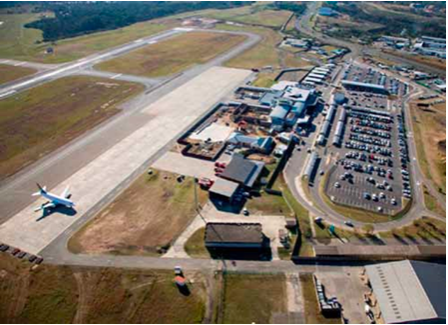 With the runway 100 per cent complete and the airport terminal 25 per cent complete, the Eastern Cape government is confident that the airport will attract traffic and stimulate economic growth.
With the runway 100 per cent complete and the airport terminal 25 per cent complete, the Eastern Cape government is confident that the airport will attract traffic and stimulate economic growth.
Upgrades to the airport, which began in January 2011, are expected to be finalised before the end of this year.
It cost government R120 million to rebuild the airport and about 522 jobs were created during construction.
The provincial government said that it expected the revamped airport to expand its flight destinations. With a bigger runway, the airport can now accommodate flights of all sizes.
In 2009, the area of Mthatha was declared a Rapid High Impact Presidential Intervention Node.
The intervention was intended to address infrastructure backlogs, service delivery challenges and fully revitalise Mthatha through projects such as the upgrading of the Mthatha Airport, as well as roads, water, sanitation and electricity upgrades.
In January, Minister Collins Chabane, who is responsible for Performance Monitoring and Evaluation as well as Administration, visited Mthatha to check on the progress.
He said he was encouraged with the work being done.
“However, we have noted that there are challenges in a number of areas which officials are working very hard to address. We will continue to work together with the province and the municipality to complete all outstanding work,” the Minister added.
Other projects currently underway by the Eastern Cape government include the upgrading of informal settlements in Joe Slovo, Chris Hani, Mandela Park and Pholela Park.
The Waste Water Treatment Works in Mthatha is also set to undergo a major revamp. This will include the upgrading of the water-borne sewerage system in Mqanduli and bulk water infrastructure in Mthatha, Mqanduli and Coffee Bay.
The Amatola Water Board has been appointed to support the OR Tambo District Municipality with water and sanitation projects.
In addition, 41 per cent of the planned road projects such as the Ultra City to Viedgesville, Airport to Madeira, Jubilee Square, Ultra City to Mthatha River and Ugie to Langeni have been completed.
The construction of the Mthatha Dam Tourism Centre has been completed and furniture for the conference centre delivered. The Department of Environmental Affairs has approved additional funding of R9.5 million to finalise work on the site.
The Industrial Development Strategy, which is expected to be adopted by the Mayoral Committee, will further stimulate economic activity in the area.
Projects identified to support local economic development include the Kei Fresh Produce, Mqanduli Milling Plant, Ngangelizwe Transido Small Business Hub, Wool Clip and Processing, Langeni Timber Cluster Development and the Vulindlela Heights Industrial Zone/ Logistics Hub.
These infrastructure projects promise to drive economic development and position Mthatha as a key destination in the Eastern Cape.
*Ndlelantle Pinyana works for GCIS in the Eastern Cape.
Take your meal – with a pinch of salt
Take your meal – with a pinch of salt sadminSouth Africans can expect less salt in their food as part of government’s drive to encourage people to adopt healthier lifestyles.
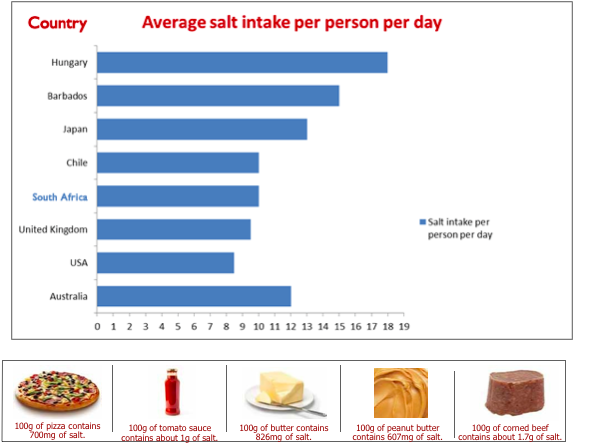 New regulations will mean that salt-loving South Africans will have to settle for less salt in some food products in the years to come.
New regulations will mean that salt-loving South Africans will have to settle for less salt in some food products in the years to come.
The World Health Organization (WHO) recommends a daily salt intake of 4 to 6g, which is about a teaspoon a day, but the average salt intake in the country is 8 to 10g.
Studies show that some South Africans are even consuming as much as 40g of salt a day.
Health Minister Dr Aaron Motsoaledi, who signed regulations to reduce the salt content in several food items recently, said South Africans’ love for salt increased their risk of hypertension.
Reducing salt would help curb hypertension, high blood pressure, heart attacks and other health problems experienced by the country’s population, the Minister stressed.
To limit the amount of salt in certain food, Minister Motsoaledi made amendments to the Foodstuffs, Cosmetic and Disinfectants Act of 1976.
The new regulations require food manufacturers to ensure that bread, butter, cereals, chips, stock cubes and processed meat contain less salt by 2019.
Currently, the number one food item consumed by South Africans is bread. Each loaf of bread contains 4.8 per cent of salt. The new restriction will ensure that a loaf of bread contains about 4 per cent salt by 2016 and almost 3.8 per cent by 2019.
The Department of Health, in partnership with the South African Heart and Stroke Foundation, will also embark on a campaign to educate the public on the new regulations and dangers of salt.
Recommended daily salt intake for children: 0 to 6 months – under 1g; 6 to 12 months – 1g; 1 to 3 years – 2g; 4 to 6 years – 3g; 7 to 10 years – 5g; 11 or more – 6g.
For more information contact the Department of Health on 012 395 8000.
Living with multiple sclerosis
Living with multiple sclerosis Estelle GreeffMelissa van Wyk* is a 35-year-old high school teacher from Port Elizabeth who relied on daily walks and a good diet to keep healthy.
 She was always careful to maintain her health so it came as a shock when a year ago she suddenly started struggling to walk and was constantly exhausted.
She was always careful to maintain her health so it came as a shock when a year ago she suddenly started struggling to walk and was constantly exhausted.
Van Wyk says it was like her legs weren’t “listening to her brain” so she decided to visit her doctor immediately.
Her doctor sent her to a neurologist who booked her for a brain scan. From the scan, the neurologist was able to determine that Van Wyk had a disease of the brain and central nervous system called multiple sclerosis or MS.
Van Wyk was in shock when she was told she had MS. She wasn’t sure what MS was but she had heard it was serious. The neurologist explained to her that researchers are not completely sure what causes MS but what is known is that the body’s immune system attacks the nervous system.
Some people are more susceptible to developing MS than others. For example, it is much more prevalent among people of European descent than those of African descent and more common in women than men. MS is not contagious and it is not passed genetically from parents to children. The disorder is most commonly diagnosed between ages 20 and 40 but can be seen at any age.
MS attacks the myelin sheath, which protects the nerves within the central nervous system. These attacks can cause the flow of communication between the nerves to become interrupted and sufferers to go through periods during which they can feel they are losing the ability to control their bodies.
Possible early symptoms
Symptoms can include:
- Lack of coordination and trouble with balance.
- Difficulty walking.
- Weakness in a limb.
- Tingling, numbness or pain in the limbs.
- Double vision or loss of vision in one eye.
- Fatigue.
If you experience these symptoms visit your doctor immediately because early treatment can help prevent flare-ups of the disease.
A progressive disease
Doctors say the disease affects each individual differently depending on which parts of the brain and nervous system are attacked and how serious the condition is. In some cases it can be devastating, attacking the brain, spinal cord and nerves of the eye, causing a number of disabilities. Some people experience severe fatigue and loss of mobility when the disease progresses. There are those whose illness progresses to the point where they completely lose their mobility and have to use a wheelchair. Others are not so severely impacted by the disease and live normal lives.
Most people with MS have occasional relapses, which tends to advance the progress of the disease. It is a progressive degenerative disease, which means that it tends to get slowly worse over time. In between these MS bouts or flare-ups, sufferers may live completely normal lives without any deterioration.
Treatment reduces relapses
There is no cure for MS but a range of new treatments is available to treat the symptoms and slow the progression of the disease. These are able to extend the time between relapses as well as reduce the total number of relapses and their severity. Some people respond to treatment better than others. Van Wyk is one of those who has responded well, experiencing no further problems since her first attack.
She says that she is not as fearful of MS as she was when first diagnosed. Her doctor pointed out that most patients with MS could expect to live as long as anyone else and with advances in treatment, many of these years will be productive and free of serious disability.
Van Wyk has accepted that she is in a new phase of her life and is prepared to face whatever her future holds.
*Not her real name.
Sources:
1. PubMed Health, http://www.ncbi.nlm.nih.gov/pubmedhealth/PMH0001747/
2. Mayo Clinic, www.mayoclinic.com/health/multiple-sclerosis/DS00188
3. Multiple Sclerosis South Africa, www.multiplesclerosis.co.za
Feeding stomachs and minds
Feeding stomachs and minds sadminMore than 10 million breakfast meals have been served to needy learners across the country in the past two years, fi their stomachs so they can concentrate on their lessons.
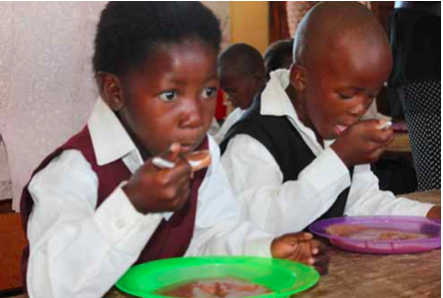 The Department of Basic Education reached the milestone of the 10 millionth meal recently, just two years after partnering with the Tiger Brands Foundation (TBF) to provide nutritious meals to needy learners.
The Department of Basic Education reached the milestone of the 10 millionth meal recently, just two years after partnering with the Tiger Brands Foundation (TBF) to provide nutritious meals to needy learners.
Basic Education Minister Angie Motshekga joined a delegation from the foundation, together with provincial and district education officials, to celebrate at the Gqebenya Junior Secondary School in the Eastern Cape, where a special breakfast event was held.
The programme, which began in Alexandra, Gauteng, in 1994 with six just primary schools, now feeds almost 21 000 primary and high schools countrywide.
More recently, with the help of the TBF programme, a bigger impact has been made on government’s National School Nutrition Programme.
Learners are served with Mabele (soft porridge) for breakfast, and rice, chicken and vegetables for lunch.
The programme addresses child hunger and creates a link between nutrition and education. More than 54 000 volunteers countrywide prepare meals for about eight million learners every day.
At the celebration, Minister Motshekga said it was important for learners to start the day with a good breakfast.
“No child can follow what the teacher says in class on an empty stomach,” she pointed out.
Minister Motshekga added that government had prioritised school nutrition and R5 billion had been spent on feeding learners in the past year.
She said that the department was committed to supporting learners whose learning was compromised by not having enough food. In many schools, teachers found that learners suffered from fatigue because they had to walk long distances from home to school.
The programme provides meals to deserving learners from rural areas, informal settlements and urban schools where performance in class may be affected by poor economic conditions.
“While learners are provided with nutritious meals, they also are taught to establish and maintain good eating and lifestyle habits. We encourage schools to establish food gardens from which they obtain fresh produce such as fruit and vegetables to supplement the school meals,” added the Minister.
TBF CEO Peter Matlare said the poverty that children endured remained a stumbling block.
“For us the important thing is to make a difference in the lives of these learners. All of us started school at this level and it is critical that we support the children in this way,” he said.
Minister Motshekga also urged parents to take keen interest in their children’s schoolwork and the school nutrition programme.
“Motivate learners to take care of school assets, like plates and spoons, that are provided by the department and the foundation,” she said.
*Tshepo Ramonoedi works for the Department of Basic Education
New Jerusalem a safe haven for children
New Jerusalem a safe haven for children sadminIn South Africa thousands of children are abandoned, abused and orphaned every day.
 Communities are faced with an over-flow of children who have no homes or families to care for them. One such community is in Midrand, Gauteng, where some children have little hope for the future.
Communities are faced with an over-flow of children who have no homes or families to care for them. One such community is in Midrand, Gauteng, where some children have little hope for the future.
The answer to these children’s prayers are sisters Anna and Phina Mojapelo, who are passionate about providing shelter and protection for children.
Anna is a lawyer, businesswoman and community developer, while Phina is a social worker who, for many years, has worked with children, youth and those with HIV/AIDS.
The safe haven they provide for children started in 2000, when Phina brought home a child who needed help. Today they care for 80 children at the New Jerusalem Children’s Home, assisted by the Department of Social Development, the Eskom Development Foundation and donations from the public.
“It was our duty to build a home for the children and they have changed our lives forever,” says Phina.
And while Eskom’s primary job is to keep the lights on, the state-owned company also focuses on job creation, infrastructure development, skills training and community development through the non-profit Eskom Development Foundation, which is funded by the power utility.
“New Jerusalem is a remarkable organisation not just because of the good work it does in providing a safe and caring environment for the children in their care but because they have put sustainability at the heart of how they operate,” says the foundation’s CEO, Haylene Liberty.
Since its inception, the home has expanded and now includes a pre-school, primary school, day-care facilities and home for primary school children.
Volunteer and fundraiser Adrienne Feldner also played a hand in setting up the home, enlisting the help of several specialists who all donated their time and expertise to work on the project.
Architects Adam Kalkin, Sean Wall and Mia Anfield created a building made from 28 recycled containers and powered by solar panels to keep the construction, maintenance and running costs down. The entire house cost R2.2 million to build, with a further R320 000 for the solar water heating system and furniture, and is the first ever eco-friendly residential home the province.
With four small homes, each containing 12 children and a house mother, the sisters aim to build more container homes and take in more children in need.
The home and school is situated on an agricultural small holding that is not connected to the municipal sewage system. To remedy this, a domestic Biobox system was installed to convert all waste water from the kitchen, laundry, toilets and bathrooms into water for irrigation.
The home’s eco-friendly status is something the founders and children who live there are equally proud of.
“It is important to recycle and take care of our environment because how we treat our land today, determines the type of environment we have tomorrow,” says 13-year-old Siyabonga Masemola.
He arrived at the home when he was six and says he is blessed to have many caregivers as mothers.
Aurora Kwakwadi, 12, was brought to the home as a baby and says she loves school and wants to become a teacher. “I want to teach children how to read, write and think for them- selves so they become strong and independent people.”
To contribute to the New Jerusalem Children’s Home contact Anna Mojapelo on 010 224 0460 / 082 7327 832 or email amojapelo@hotmail.com
Youngsters make farming cool
Youngsters make farming cool sadminAfter completing matric in 2004, Donald Sekwati was determined to prove that a young person could make a living out of farming.
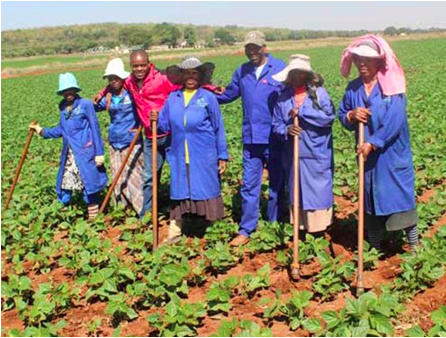 So in 2005, he teamed up with six others, including two disabled community members, to start a farming business. Together they formed and registered the Kopano Disabled Cooperative.
So in 2005, he teamed up with six others, including two disabled community members, to start a farming business. Together they formed and registered the Kopano Disabled Cooperative.
The group were given land for their venture through the Limpopo Department of Agriculture’s Land Redistribution for Agricultural Development (LRAD) Programme.
The cooperative grows green beans, butternut, cabbage, tomatoes and sweet corn on the farm in Rooibokkop, about 30km from Marble Hall, in Limpopo’s Sekhukune District Municipality.
“Young people tend to disregard the farming profession when in fact there are a lot of opportunities in this field. I joined this cooperative because I wanted to be an example to my peers and show them that farming is a career that young people could look into,” Sekwati said.
He credits the cooperative with changing his life, as he can now support his family through the income he receives as a cooperative member.
“The farming sector is sustainable because people need to eat. Produce can be sold to the community and supermarkets. I believe I chose the right career and I would encourage other young people to get involved in farming.”
Sekwati, who is the secretary of the business, explained that in 2005 the cooperative received 170 hectares of land through LRAD Programme.
Since then the cooperative has grown and now has 14 employees, including the two that are disabled.
“We also have contracts with McCain and Tiger Brands to supply them with our produce,” said Sekwati.
During the 2012 harvest season, the cooperative delivered 16 tons of green beans, exceeding the projected 11 tons.
The cooperative received assistance from the National Development Agency (NDA), the Limpopo Economic Development Agency (Leda) - formerly known as the Limpopo Business Support Agency - and the Department of Rural Development and Land Reform. Leda falls under the Department of Economic Development in Limpopo.
The financial assistance enabled the cooperative to buy equipment such as a tractor, delivery truck and other implements to make their operations more efficient.
They have also received training to help them run the cooperative better.
The NDA Limpopo’s provincial manager, Professor Zach Chuenyane, said the agency was extremely pleased with the cooperative’s success.
“We are very proud of Kopano Disabled Cooperative as they have proved that some communities, with the help that they receive from government, can take development into their own hands and ensure that funded projects are sustainable.”
He pointed out that the NDA is a government agency mandated to contribute to poverty eradication.
Sekwati said the assistance received from NDA and other agencies not only helped the cooperative but also other people in the area.
The cooperative has passed on their skills to other emerging farmers and also created employment opportunities for the locals.
“We would like to expand our business and maybe go into poultry farming. We know that there is potential in that market. We would also like to see each member of the cooperative owning their own farm - that is our bigger plan,” said Sekwati.
For more information on the Limpopo Economic Development Agency call 015 287 3000 or email info@libsa.co.za. For more information on the National Development Agency, contact the Limpopo office on 015 291 2492 or the national office on 011 018 5500.
Farmer breeds success with Nguni cattle
Farmer breeds success with Nguni cattle sadminLimpopo farmer Victor Matjuda was introduced to the rearing of Nguni cattle only a few years ago but he is already reaping the rewards of getting involved with an “awesome breed”.
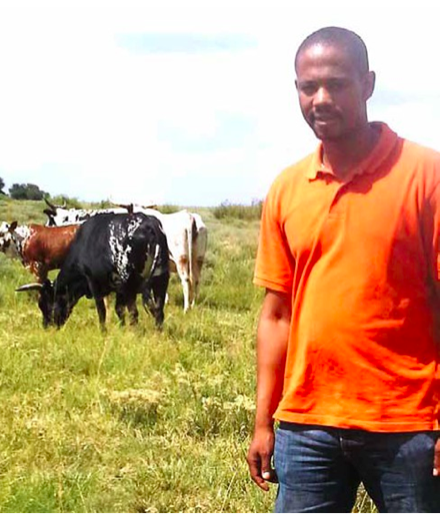 Matjuda, 34, started breeding indigenous cattle in 2009 after participating in the Limpopo provincial government’s Nguni cattle breeding programme.
Matjuda, 34, started breeding indigenous cattle in 2009 after participating in the Limpopo provincial government’s Nguni cattle breeding programme.
“Participating in the programme was a break-through for me. It helped me become one of the young successful stud breeders in province,” said Matjuda.
The cattle breeding initiative - a partnership between the Limpopo Department of Agriculture, Industrial Development Cooperation (IDC) and University of Limpopo - aims to empower and upgrade cattle farming in deep rural areas.
The IDC, which has invested R2.5 million, approves grants for the project while the university helps with research and running the programme.
To qualify for the programme, applicants must own a farm equipped for cattle or have a long-term lease at a state owned farm. They also need to show entrepreneurial abilities and cattle management skills.
Last year, Matjuda was the second runner- up at the Aspirant Young Farmer of the Year competition in the Top Producer for National Markets category.
“Reward is always a great incentive and motivation. It proves value, quality and success in all that you dedicate your time, energy and money to and where you aspire to be, saying to you the sky is but another platform to step on but not the limit,” he added.
Matjuda developed his love for cattle from an early age.
“I grew up among cattle and fell in love with livestock farming in 2006. I got into the programme in 2009 with a loan of 30 cattle and a bull. They have multiplied into more than 100 in the past few years,” he said.
Matjuda described working with the Nguni breed as “awesome”.
“It gives a lot of satisfaction and it’s not a ‘sissy’ animal. Being able to provide meat for families, helping breadwinners provide for their families and also being able to live a rewarding peaceful lifestyle made me realise that I made a right choice,” he said.
However, like every farmer, Matjuda also encounters problems.
“Challenges such as stock theft remain a stumbling block and a thorn in the flesh for many livestock farmers in the province. Grazing fields are also problematic as the more the business grows, the smaller the land becomes.
“Stock theft, veld fires, marketing issues, especially when you are starting out, is still problematic, but with the effort that the department is making, we will overcome it,” Matjuda said.
Department spokesman Kenny Mathivha said that since the introduction of the programme, many emerging stud breeders had improved their production.
“We are happy that the programme empowers emerging farmers to become beef production farmers and create jobs in their communities,” Mathivha said.
He added that more than 44 projects have benefited from the programme and about 1 500 Nguni cattle have been loaned to farmers.
For more information contact the Limpopo Department of Agriculture on 015 294 3000.
Small claims court helps settle Soweto disputes
Small claims court helps settle Soweto disputes sadminWhen Kabelo Sebake bought a second-hand car, he thought the days of standing in long queues waiting for public transport were over.
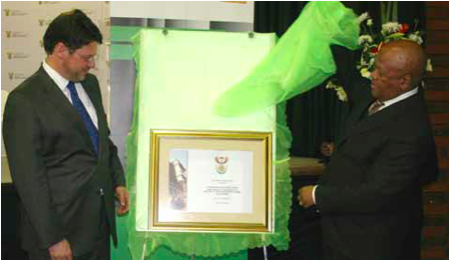 He was looking forward to an easier journey to work but the 24-year-old, from Soweto, soon had his bubble burst.
He was looking forward to an easier journey to work but the 24-year-old, from Soweto, soon had his bubble burst.
Sebake’s car needed some minor maintenance, which included replacing engine parts and adjustments to get it roadworthy.
After some referrals, the cellphone technician took his car to a local mechanic who promised that the car would be good to go in less than a month.
The mechanic demanded R4 700 upfront for labour and the parts he needed to buy. A trusting Sebake paid the mechanic.
To his surprise the mechanic did not carry out the repairs within the agreed time. Seven months later his car was gathering dust at the workshop, the mechanic was avoiding him and Sebake was taking taxis again.
Devastated and humiliated, Sebake approached the mechanic for answers, which ended in a heated exchange of words.
Sebake decided to take his car back to be fixed by a different mechanic when he heard about the newly established Protea Small Claims Court in Soweto.
Armed with renewed hope and receipts for the car parts he had bought, he went to the court to seek justice.
At the court the friendly staff explained the process of filing a claim against the dodgy mechanic and helped him fill out all the necessary paperwork. A summons was issued against the mechanic and he received a subpoena to appear in court.
Recently, Sebake’s case was heard in court and he was granted a court order to have his original car parts worth around R3 600 returned to him. Sebake claimed damages of more than R8 000.
The case was adjourned for more wit- nesses to give evidence before the final amount of compensation could be decided.
Without the help of the court Sebake says he would have struggled to afford a lawyer to represent him and his dispute would have taken longer to resolve.
The Protea Small Claims Court assists with civil matters or disputes of less than R12 000 and was officially launched by Justice Minister Jeff Radebe in April.
Cases can be registered between Mondays and Fridays but court proceedings only take place on Tuesday and Thursday from 4.45pm until late. Up to 20 cases are heard a day.
The court is a free service for the people of Soweto and surrounding areas.
More training, resources for detectives
More training, resources for detectives sadminCrime fighting in South Africa has been given a major boost with the South African Police Service (SAPS) putting more resources into training detectives.
Speaking at the first National Convention for Detectives recently held in Hamanskraal, Gauteng, National Police Commissioner General Riah Phiyega said millions had been invested in improving detectives’ skills.
“A total of R42 million had been allocated to the training of detectives and 4 415 members were trained in various programmes, with 4 091 members attending short-term interaction courses,” she said.
Detectives are police officers who are trained to investigate crimes in specialised areas such as murder, robbery, narcotics, family violence and car theft. They work with officers and forensic specialists to gather and analyse evidence, inter- view witnesses and identify suspects. Detectives play a critical role in ensuring that criminals appear in court.
General Phiyega said resources were also allocated to improve detectives' working conditions.
This included vehicles, laptops, steel and lock- able filing cabinets, cooler boxes for exhibits and freezers for Stock Theft Units.
At the convention, a strategy to retain detectives was also agreed on.
In addition, delegates agreed that special measures should be taken to protect whistle-blowers.
General Phiyega stressed that detectives and other police offices needed to display a culture of service delivery and client satisfaction.
Earlier this year 1 002 police officers graduated in different sectors enhancing their skills in the fi against crime. Of the group that graduated, 331 were detectives.
*Colonel Teddy Kommal works for SAPS
Constable Shikhati raises the bar
Constable Shikhati raises the bar sadminAs a child, Constable Kulani Shikhati dreamt of becoming a police officer.
![]() As an adult, she has not only realised her dream but has also become the first woman to join the Tactical Response Team (TRT) in Mpumalanga.
As an adult, she has not only realised her dream but has also become the first woman to join the Tactical Response Team (TRT) in Mpumalanga.
Shikhati, 25, is not only an inspiration to all everyone who knows her but is also an outstanding police officer and a pioneer in her community.
Born and raised in Tzaneen, Limpopo, she is the youngest of five children, including two who are police officers. Her older sister is Constable Charlotte Shikhati, who is stationed at the Ngodwana Police Service and the other sister, Sector Commander Captain Shirley Shikhati, is at the Nelspruit Police Service.
After completing matric at the Bankuna High School in 2004, Shikhati pursued her love for food and obtained a Diploma in Hospitality and Catering from the Vaal Technikon. She then worked as a chef at the Emnotweni Sun Hotel, honing her skills, but soon realised that her real passion lay in policing.
In 2009, finally ready to follow her dream, she enrolled for the South African Police Service (SAPS) Basic Training Course at the Pretoria West College.
An adrenalin junkie, who thrives on challenges, it’s no surprise that her favourite subjects at college were street survival, weaponry and physical training. After completing her degree and then field training at the Nelspruit Police Station, she saw a memo requesting candidates to apply for the pre-selection to the TRT and signed up without hesitation. She was on probation at the time.
A few months later, she was selected to train with the TRT. The unit is called in to handle medium to high security risk needs of various police stations and clusters. They combat crime, restore public order (crowd control), escort dangerous criminals, provide tactical assistance to other units, police sporting events and assist during disaster management.
According to Shikhati, in her line of work fitness is key. Only police members who are mentally and physically fit are chosen. In order to pass the physical test for the unit, candidates had to complete an 8km run in under an hour while wearing a bullet proof vest and carrying a R5 rifle.
The run included jumping over a wall eight times in under a minute, shuttle runs, leopard crawling and pistol shooting.
“To get through the 10-week rigorous training one needed to learn to motivate oneself. I have always been somebody who believes in finishing what I start,” she said.
Even though Shikhati had her moments of weakness, her mental attitude allowed her to remain focused and finish the training.
“I was the only woman and felt I could not relate with my group members, that is when I realised that I needed to have mental strength. My motivating factor was not only the pride of having completed what I had started, knowing that I was the only woman to ever do so was the icing on the cake that pulled me through.”
Her determination also earned her the respect of the male candidates who were part of the training.
"She pulled her weight and shocked the guys. We are very proud to have her in our team. She is a remarkable police officer,” said one of her colleagues Captain Gajeni Ndlovu.
Constable Shikhati said she feels fulfilled in her job.
“I enjoy every second of being in the team. I love my job and I have no regrets for leaving the hospitality industry to pursue my calling. One day I hope to become a commander.”
She urged young women to join the police service and try out for the TRT unit.
“We owe it to ourselves, as women, to challenge ourselves to reach greater heights,” she added.
Emerging herb farmers groomed for success
Emerging herb farmers groomed for success sadminSuccessful herb farming requires careful planning, close attention to detail, patience and the necessary skills to grow crisp and fresh herbs that consumers will grab from grocery shop fridges.
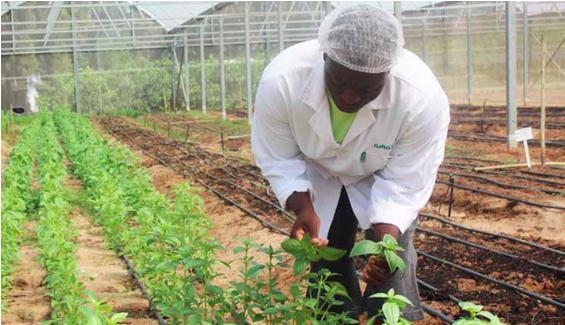 Without these skills, farmers could end up producing wilted and soggy herbs, causing their businesses to suffer and losing out on lots of money.
Without these skills, farmers could end up producing wilted and soggy herbs, causing their businesses to suffer and losing out on lots of money.
The Timbali Technology Incubator - a centre in Mpumalanga that was created with the help of the Small Enterprise Development Agency (Seda) and the Department of Agriculture, Forestry and Fisheries - helps young emerging farmers gain the skills needed to survive in the flower and herb industry.
Timbali was created to attract more youngsters into the farming field, said its CEO Louise de Klerk.
“We are facing a huge problem as a country, as the average age of a farmer in South Africa is 65. Youngsters are not getting into farming because it’s not as exciting a field but we at Timbali have made farming exciting through our mentorship programmes,” she explained.
Timbali helps hundreds of small-scale farmers through its Amaspice, Amaveg and Amab- lom projects, which supports farmers growing herbs, vegetables and flowers.
Despite the projects’ success, farmers still faced seasonal problems such as their crops not lasting as long as they hoped it would.
What Timbali needed was a steamroller as well as storage facilities and fridges to keep the crops fresh for longer.
Previously, farmers used a chemical called methyl bromide to fertilise soil. However, over time this product was found to be dangerous to the environment and was eventually phased out.
It was found that a steamroller could be used to fertilise the soil. This was a much cheaper option and better for the environment.
The Eskom Development Foundation jumped on the bandwagon and donated the steamroller, making Timbali the leader in soil technology in the country. The steamroller eliminates soil pathogens, which are impurities in the earth, and makes the soil fertile for crops to grow. The foundation also donated a storage fridge for farmers to store and cool their crops, keeping them fresher for longer.
One of the project’s supervisors is Nonhlanhla Mgwenya, who was the first farmer at the centre to start coriander and basil planting in 2006. Her day used to start at 4am when she would wake up to plough the fields, plant and prune the coriander plants.
With the storage fridges those early mornings are a thing of the past.
“My team and I no longer have to wake up early and cut crops before the sun rises. We can now spend more time with our families and have a better quality of life,” said Mgwenya.
Mgwenya, who lives in the nearby Kabokweni village, joined Timbali as a citrus farmer.
“It was very hard to get a job. I am a mother of two children and it was hard to provide for them. Timbali took me in and gave me the skills and knowledge to change my life and the lives of others.”
Today Mgwenya leads the Amaspice team as a supervisor and passes on her skills to youngsters joining the farming field. She ensures that all crops maintain the high standards of quality needed to supply to mega food franchise Woolworths.
With help from Timbali and Seda, emerging farmers are exposed to the climatic and infrastructure advantages of crop production in Mpumalanga.
“A new farmer faces many challenges upon entering the viciously competitive market. A good understanding of the agricultural trade, skill, knowledge and experience in crops are essential in an industry where quality is non- negotiable. This is how Timbali helped, with a unique concept that ensures that a high volume of good quality produce can be produced for both the local and export markets,” said De Klerk.
Through the support of the Eskom Development Foundation, Timbali has become globally accredited, meaning it can export to international markets as the accreditation confirms confidence in the quality of its products.
To date, Timbali has helped more than 150 emerging young farmers and aims to create 17 000 jobs in the next five years. Currently the project creates an average of 300 direct, seasonal and indirect jobs per year.
“This job creation project is a result of a tri-party agreement we’ve recently secured with the Department of Agriculture, Fisheries and Forestry and the Seda technology programme. The agreement will result in the creation of more than 17 000 sustainable jobs in the next five years. Timbali is a suitable partner for government and private enterprises to up-scale an already working and successful model,” said De Klerk.
For more information contact the Timbali Technology Incubator on 013 752 4247 or visit www.timbali.co.za
IDC backs youth owned businesses
IDC backs youth owned businesses sadmin Businesses owned by young people are set to benefi from the Industrial Development Corporation’s (IDC) Gro-E Scheme.
Businesses owned by young people are set to benefi from the Industrial Development Corporation’s (IDC) Gro-E Scheme.
The scheme offers financial support to start-up businesses with the main aim of contributing towards sustainable job creation.
Launched in 2011, the scheme has to date approved R3.5 billion to 114 companies and is expected to create 23 800 jobs.
As part of the signing ceremony of the Youth Employment Accord, the IDC has earmarked R1 billion of the Gro-E Scheme for businesses owned by young people.
This fund provides loans at prime less 3 per cent to businesses that operate in industries falling within the IDC’s mandate and are creating new jobs. The funding is available to South African citizens and the minimum amount for finance is R1 million.
Geoffrey Qhena, the CEO of the IDC, said young entrepreneurs play an important role in the economic development of the country.
“It is important that we recognise the role that young people play in developing the country’s economy and the fund will go a long way in helping youth grow their businesses. The fund will also contribute to reducing the current levels of unemployment.
“This specific fund will support the youth to become part of the solution to curb unemployment. Young people are very enterprising. However, access to funding has been one of the greatest challenges,” explained Qhena.
Applicants for the Gro-E Scheme must be:
- Start-up businesses needing funding for buildings, machinery and working capital.
- Existing businesses that want to expand.
- Businesses that demonstrate economic merit and have prospects of acceptable profitability.
- Businesses whose maximum cost per job do not exceed R500 000.
The funding period will be structured to meet the cash flow needs of the business. Qhena said appropriate capital and interest payment holidays would be applied depending on the financial needs of the business. There is no prescribed minimum for owner contribution.
In addition, the scheme is aimed at companies with more than 50 per cent youth ownership.
Qhena said the IDC would work very closely with institutions such as the National Youth Development Agency, Small Enterprise Development Agency, Small Enterprise Finance Agency and sector bodies to ensure that the fund is well marketed.
“We appeal to experienced entrepreneurs to join with the youth in establishing businesses to ensure that these new entrepreneurs are coached and mentored.”
Applications to the IDC can be made at any of its regional offices or the Pre-Investment Business Centre at its Sandton head office. Entrepreneurs can make use of IDC’s online application facility, accessible via its website on www.idc.co.za
*Mandla Mpangase works for the IDC
New technology gives milling industry a boost
New technology gives milling industry a boost sadminA newly launched compact mill will not only make it much cheaper to grind maize into flour but is also expected to create jobs.
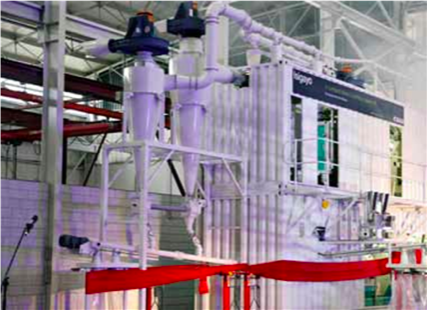 The mobile technology maize mill is a two-ton per hour compact mill designed by the Buhler Group and requires very little training before operating it.
The mobile technology maize mill is a two-ton per hour compact mill designed by the Buhler Group and requires very little training before operating it.
The Isigayo Compact Mill has a low start-up cost and is targeted at small to medium enterprise millers, commercial maize farmers and small farming communities.
The compact mill has the potential to re- store milling as a lucrative industry in South Africa and provides an opportunity for the industry to alleviate poverty, attract new players, create more jobs, develop skills and provide affordable nutrition.
According to the Department of Trade and Industry’s (dti) acting deputy director-general, Garth Strachan, the Isigayo Compact Mill is a game changer.
“This is a new mobile technology that will bring new players into the market, build small, medium and macro enterprises (SMMEs) and assist in lowering the price maize,” he pointed out.
The technology will help government establish a commercially viable small-scale maize milling sector that will introduce competition in the milling industry.
Almost 37 per cent of the consumer price of maize meal goes to the transporting and logistical costs of the crop. The new mill allows for easier and more affordable crop production. It will also save the department and government millions of rands in tax incentives.
A large portion of dti’s R12.5 billion tax incentive for the past two years has gone into the agro-processing sector, covering various costs such as transporting food to the markets, among others.
According to Buhler South Africa CEO Calvin Grieder, the Isigayo Compact Mill is affordable and easy to transport.
He added that the new innovation would not only create jobs and develop skills while improving nutrition, but would also empower and generate an income for entrepreneurs and existing small-scale millers.
“Over the years government has placed a great deal of importance on agro-processing, as many opportunities exist within the sec- tor. Buhler supports this initiative fully,” he said.
The Isigayo Compact Mill is fi with standard Buhler equipment, is pre-assembled in two containers and pre-engineered as a complete milling plant. Very little infra- structure is necessary and the mill is easily transportable. This is especially beneficial for SMMEs that are expanding into milling.
Solar energy lights up Ekurhuleni’s informal settlements
Solar energy lights up Ekurhuleni’s informal settlements sadminMore than 7 000 households in informal settlements across Ekurhuleni, Gauteng, can look forward to a brighter future with the roll out of a new solar energy lighting project.
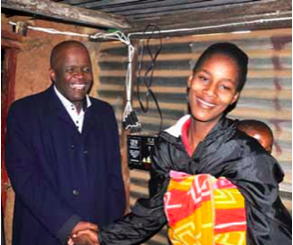 City of Ekurhuleni Executive Mayor Mondli Gungubele launched the R17.5 million project at the Umgababa informal settlement near Daveyton recently.
City of Ekurhuleni Executive Mayor Mondli Gungubele launched the R17.5 million project at the Umgababa informal settlement near Daveyton recently.
The ultimate goal of the project is to make informal settlements more liveable by providing residents with basic municipal services such as lights and water, while the process is underway to either formalise or relocate informal settlements.
Ponki Mofokeng, 35, was one of the overjoyed residents whose life is set to improve.
“Just because we live in an informal settlement does not mean that we have to live in darkness. It was very hard to cook or help my children with homework under candle light, so I am so grateful for this project,” she said.
Each home will get a 10-watt solar lighting unit consisting of a solar panel, battery control box and four light emitting diode (LED) lights. The solar panels will be placed on rooftops but will be fitted and built from within the house to keep the thieves at bay.
The life-span of the battery is three to fi years and LED lights have the capacity to shine for up to 100 000 hours. The project is expected to create 24 temporary jobs for community members from the Umgababa informal settlement.
The project will benefit over 7 000 households which have been classified as Category C. These are areas where there are no short to medium term plans for it to be upgraded or relocated. Gungubele also confirmed that the project would eventually be rolled out to other informal settlements in the municipality, which are outside the targeted category, benefitting tens of thousands of households.
Gungubele said the municipality was constitutionally bound to make sure that informal settlements were suitable for people to live in, without necessarily encouraging the mushrooming of these settlements.
“We respect the fact that it is people who stay in those shacks and there are kids who are being raised in such conditions. This project is about preserving the dignity of our people,” he said.
Residents currently spend on average R13 a week on candles and have been paying between R5 to R10 to charge their cellphones at the homes of neighbours who have electricity.
For more information contact the City of Ekurhuleni on 0860 543 000
SA’s textile industry on the rise
SA’s textile industry on the rise sadminThe Clothing and Textiles Competitiveness Programme (CTCP) has SA’s textile industry on the rise created more than 12 000 new permanent jobs in South Africa’s clothing, textiles, leather and footwear sectors since it was launched in 2010.
This was revealed by Lionel October, director-general of the Department of Trade and Industry (dti), at the Source Africa 2013 Conference in Cape Town recently.
According to October, the programme has helped more than 400 companies and approved R1.5 billion worth of applications.
The CTCP is a programme of the dti that is aimed at boosting the competitiveness of South Africa’s clothing and textile industry, while also creating jobs. It is part of the Industrial Policy Action Plan (IPAP), which seeks to revive labour intensive manufacturing in the country.
According to the IPAP document, the introduction of the CTCP has had a substantial impact on the textiles, clothing, leather and footwear sector in South Africa.
“However, the sector is still faced with a range of significant challenges, currency strength and volatility, under-invoicing and illegal imports, skills and competitiveness deficits and limited economies of scale in parts of the textiles sub-sector,” the document adds.
October expressed confidence that the CTCP was having the desired impact.
“Local retailers are increasing procurement from local manufacturers and there is confidence starting to be shown by the new investment in the sectors.”
He added that other Southern African Customs Union (SACU) countries have embraced the CTCP concept and Swazi- land was in the process of implementing the programme.
According to October, some African countries have experienced success in these sec- tors by using diverse strategies to develop their manufacturing bases.
“Some less developed countries have taken full advantage of international trade agreements like the African Growth and Opportunity Act to build their industries. Through these interventions countries like Lesotho have seen their textiles and clothing sectors growing to the extent that they are now one of the biggest manufacturers on the continent both in fabric and garments.”
Mauritius has also taken advantage of international agreements to stimulate its clothing sector, especially knitted garments.
“Their exports into SACU have grown substantially in the last five years whilst targeting South Africa as their main African destination,” added October.
Peanut butter puts bread on the table
Peanut butter puts bread on the table sadminThe white Thohoyandou Peanut Butter Cooperative building stands tall outside the city centre of Thohoyandou, Limpopo.
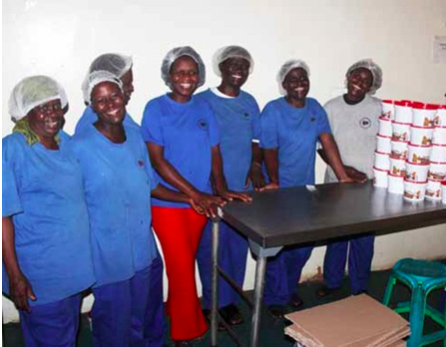 The warm thick smell of roasted nuts dominates the building and inside the peanut butter making facility the room is hot, moist and filled with tubs of peanut butter in different sizes ranging from 500 grams to 20 litres.
The warm thick smell of roasted nuts dominates the building and inside the peanut butter making facility the room is hot, moist and filled with tubs of peanut butter in different sizes ranging from 500 grams to 20 litres.
The red nuts that will be converted to smooth peanut butter are stacked in white sacks against the roasting machine. They are bought in Mokopani, in Limpopo, but when they are out of season, between November and April, they are imported from Zambia.
Registered in 1998, the cooperative that operates from this building started off with 13 members.
To get the initiative off the ground, the cooperative approached the Limpopo Economic Development Agency (Leda), formerly known as the Limpopo Business Support Agency (Libsa), for financial support.
“With the support we got from Leda, we were able to purchase machines to manufacture the peanut butter, a truck for delivery and the building,” said Daniel Managa, who is the cooperative’s chairperson.
The cooperative also employed four more people and has become one of the leading manufacturers of smooth peanut butter in Limpopo.
The peanut butter that the cooperative makes is supplied to Spar in Malamulele and Thohoyandou and other wholesalers in the area. The cooperative also supplies the provincial Department of Correctional Services.
Nkhetheni Netshanotha, the financial man- ager of the cooperative, explained that a typical day at the peanut butter factory starts at 7.30am when the nuts are placed in a roasting machine. Once roasted, they are left to cool for two and a half hours. After cooling, they are put in a blanching machine to remove the husks or skins from the nuts.
“The final step involves putting the nuts into a milling machine and then peanut butter is produced,” said Netshanotha.
Managa explained that one of the reasons he and his partners started the cooperative was because there weren’t many peanut butter producers in the area.
Members of the cooperative were unemployed and realised that making peanut butter could become a means to fight poverty.
“We saw a market and decided to tackle it and it is doing very well. In the future we would like to export our product,” he added.
Managa encouraged other unemployed people to consider starting a business but not to expect returns too quickly, saying a lot of patience was needed to survive in the world of business.
Last year the cooperative won Productivity SA’s National Productivity Award.
For more information on Leda call 015 287 3000, email info@libsa.co.za or go www.libsa.co.za to locate their 20 branch offices across Limpopo.
Needy farmers benefit from biofuel project
Needy farmers benefit from biofuel project sadminGovernment has invested more than R346 million to purchase land that will be redistributed to underprivileged farmers in the Chris Hani and Cacadu Districts of the Eastern Cape.
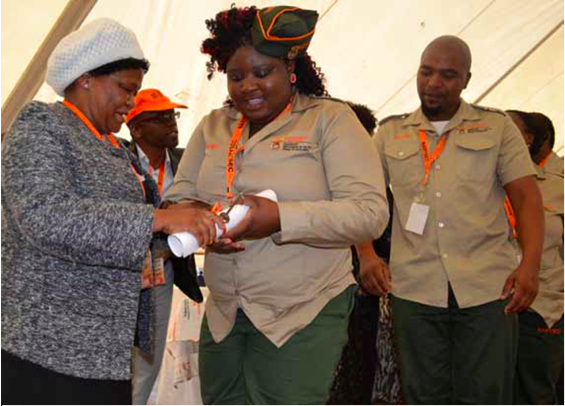 Minister of Rural Development and Land Reform Gugile Nkwinti handed over the 16 000 hectares of land, which make up the 25 farms, in Cradock recently.
Minister of Rural Development and Land Reform Gugile Nkwinti handed over the 16 000 hectares of land, which make up the 25 farms, in Cradock recently.
Livestock owners, experienced farmworkers and business people were among the 32 beneficiaries of the farms.
They will be required to plant sugar beet and sorghum in order to produce ethanol, which will be processed into oil.
The sugar beet biofuel project is aligned to the National Biofuel Strategy. Government decided to pilot the project in Cradock as a mechanism to reverse and redress the land dispossession that took place in 1913 when the Native Land Act was launched by the white minority government.
Minister Nkwinti said the biofuel project was a national one and farmers needed to be aware that the “use it or lose it” principle that would apply.
He said this step was proof that government was taking the land issue very seriously and it was launching projects to restore the dignity of all South Africans.
The biofuel project is expected to create thousands of job opportunities.
A factory that will produce ethanol from the sugar beet and sorghum is under construction in Cradock. The first phase of construction alone is expected to create at least 1 500 jobs for local residents.
The factory will have about 170 employees once completed.
A selection committee made up of the Agricultural Research and Development Agency, relevant municipalities, farmers’ unions and the Eastern Cape Rural Development Agency chose the 32 beneficiaries.
Some of the factors considered during the selection process included the prospective beneficiary’s skills and attitude towards farming, ability to operate with little assistance, willing- ness to use the arable land for the production of sorghum and sugar beet and proof of owner- ship of livestock and agricultural assets.
Details on the selected beneficiaries were then forwarded to and received thumbs up from a National Land Allocation Control Committee, which was led by the Deputy Minister for Land Reform Lechesa Tsenoli.
Two of the farms - Lenathal and Sonder Farm - were handed over to National Rural Youth Service Corps members who are currently undergoing training at the Fort Cox Agricultural College.
For more information contact the Department of Rural Development and Land Reform on 012 312 8911.
*Nangamso Ngceke works for GCIS in Queenstown
Youth Accord to enhance youngsters’ skills
Youth Accord to enhance youngsters’ skills sadminSoon it will be much easier for young people to advance their studies.
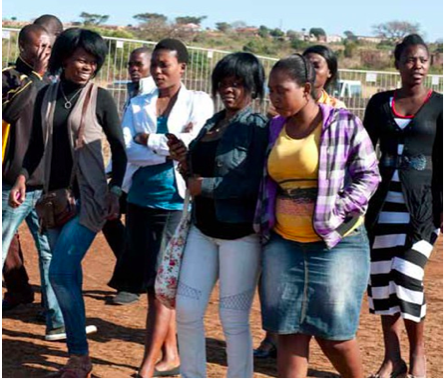 This is thanks to the Youth Employment Accord, which was recently signed by government, labour, business and youth formations.
This is thanks to the Youth Employment Accord, which was recently signed by government, labour, business and youth formations.
The accord aims to improve education and training opportunities for young people who have completed matric but are not yet employed.
Minister of Higher Education and Training Blade Nzimande said the accord sought to place young people in skilled jobs.
“We are not talking about cheap labour. This is tied to skills development.”
Minister Nzimande said that according to the Retail Motor Industry Association, there was a shortage of 10 000 motor mechanics in the country.
“The association expressed a willingness to adopt further education and training (FET) colleges to close the gap,” he added.
The country also has a serious shortage of motorbike mechanics.
He added that more money would be made available to support the skills of young people.
The youth employment strategy provides for Grade 12 learners who have failed or got poor results, to be placed on second chance matric programmes.
The number of students studying at FET colleges will also be increased “as part of building a stronger vocational and technical skills base among young people to complement the current focus on academic training,” the Minister said.
The National Youth Development Agency (NYDA) has thrown its support behind the accord and called on employers across all industries in South Africa to do the same.
NYDA chairperson Yershen Pillay said employers needed to get behind the plan by absorbing more young people into companies.
“The accord is what one may refer to as an outcome of a broad consensus between all social partners but at the end of the day, it needs the support of all young people in this country and our role as the NYDA will be to ensure that young people know that it exists. If young people have no idea what the accord seeks to achieve, then we will have a problem.
“We need to see more of the private sector employers’ involvement in issues facing the young people of this country, not only in terms of financial support but also absorbing young people into companies – whether through internships or employment.”
Pillay said based on its staff complement, the NYDA could lead by example by providing 15 young people with internships and hoped that other state entities would follow suit. The agency employs about 300 people.
“That’s realistic. It’s achievable and can be done using ourselves as an example. We can lead by example and if we create opportunities for 15 people through internships based on our staff complement, we would reach the target as stated in the accord. It’s things like that, that we need to do, to make this work.”
Through his charity organisation, the Motsepe Family Foundation, business mogul Patrice Motsepe, will avail R100 million over the next three years for youth cooperatives and enterprises - a move the NYDA has welcomed.
“We commend the likes of the Motsepe Foundation. That is what we want to see more from the private sector. We call on more companies to come to the party. We will do our part and as the NYDA, we would also like to exercise some kind of oversight or monitoring of the implementation of the actual accord to see whether certain targets are being met,” Pillay added.
Egg business hatches jobs in Mahonisi
Egg business hatches jobs in Mahonisi sadminIn 2004, Joseph Khosa left his job as an office worker at Hoxani College and started the Sasekisani Egg Production Cooperative with eight other people from the Mahonisi village, Mpumalanga.
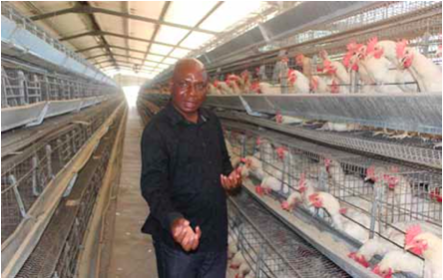 Khosa had noted that there were no suppliers to meet the growing demand for eggs in the area, so the group came together to form an egg producing business.
Khosa had noted that there were no suppliers to meet the growing demand for eggs in the area, so the group came together to form an egg producing business.
“When we started the cooperative we were working from a RDP house. We struggled to get information on running a business until we approached the Limpopo Department of Economic Development. They told us to go to the Limpopo Economic Development Agency (Leda) for business assistance,” said Khosa.
The cooperative began with 116 egg laying chickens and within a year, Leda helped it with a business plan and funding to grow the cooperative. With that support, the cooperative constructed a layer house for the chickens, put in place water tanks, a power supply and bought more egg laying chickens to expand the cooperative.
Today, the cooperative has the capacity to house 19 000 chickens, but currently has 12 000 chickens.
“We supply to local businesses and our main client is Pick n Pay in Thohoyandou. We have come a long way in our business. We started with 116 chickens then increased 250, today we have 12 000 chickens.”
Last year, the Department of Agriculture awarded the cooperative first prize for Best Operating Cooperative in the Country.
Khosa said the cooperative currently employs 14 permanent workers from the com- munity, while the other workers are those who started the cooperative.
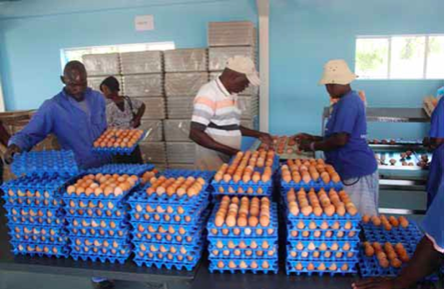 Farmworkers were employed to feed the chickens and clean the house.
Farmworkers were employed to feed the chickens and clean the house.
Lounia Shirinda, 22, is one of those employed by the cooperative.
As a house assistant, her daily duties include looking after the chickens and feeding them.
“I would also like to start my own business one day because I know that through the business I’ll be able to help reduce unemployment in my village. Being part of this cooperative has helped me. My aunt, who was the bread- winner, recently passed away and now I am able to support myself and my baby,” said Shirinda.
Khosa said starting the cooperative was not easy. He reminded those who want to follow in his footsteps that it was important to comply with all the requirements to get funding.
“You also need to believe in yourself and your business. You will find yourself competing with big companies. It is important to be independent and to continuously work hard,” he added.
For the Sasekisani Egg Production Cooperative there is still more hard work ahead. The company is looking to expand and are currently constructing a third chicken house.
Khosa said the cooperative wants to become one of the leading egg producers in the country.
Limpopo Economic Development Agency was formerly known as the Limpopo Business Support Agency.
For more information on Sasekisani Egg Production Cooperative go to www.saseggs.co.za For more information on Leda call 015 287 3000, email info@libsa.co.za or go to www.libsa.co.za to locate their 20 branch offices across Limpopo.
Govt honours children who head households
Govt honours children who head households sadminYouth matters
It was their night - a time to be recognised, lauded, waited upon and thanked by a Minister and her deputy for carrying a burden which children usually don’t - that of raising their siblings after their parents had died.
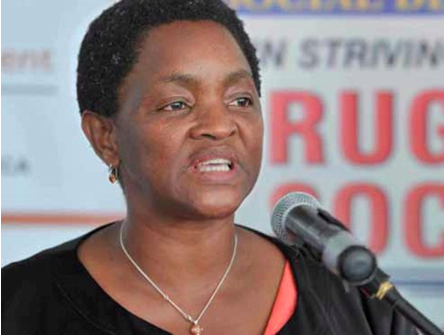 Flown in from all parts of South Africa to attend a dinner recently held in their honour, they listened intently in the heart of Cape Town, at an upmarket hotel as their hosts, Social Development Minister Bathabile Dlamini and her deputy Maria Ntuli, praised them for selflessly taking up the roles and duties of parents no longer alive.
Flown in from all parts of South Africa to attend a dinner recently held in their honour, they listened intently in the heart of Cape Town, at an upmarket hotel as their hosts, Social Development Minister Bathabile Dlamini and her deputy Maria Ntuli, praised them for selflessly taking up the roles and duties of parents no longer alive.
John Sikhumbuzo is one of those children who heads a household in South Africa. Accurate statistics on exactly how many children have been thrust into these positions by circumstances beyond their control are hard to come by. However, the Department of Social Development will soon start a national campaign to compile a register of child-headed households.
Only 18 himself, John recalled that he became a “parent” to his 16-year-old sister Sindile on 25 February 2011, when his mother Charlotte died. His father passed away when he was much younger.
“There was no one else to look after her. We still live in the house that belonged to my mother. I cook our food. I do the washing. Sometimes Sindile helps,” said the Grade 10 Khula Senior Secondary School pupil.
The brother and sister live in Mpumalanga and flew to Cape Town - their first time on an airplane.
“I was a little scared to fly. Now I feel good. I am enjoying being here,” said the youngster, who wants to be an engineer.
Seventeen-year-old Robert Mathenja raises his 15-year-old sister Thandi. He’s been doing it for the past year. Their parents died in quick succession of each other in 2003. An older sister looked after them until a year ago when she moved out, leaving Robert in charge of parenting Thandi.
“This is my first year of looking after her. The responsibility is on me. It makes me a man,” said Robert, who dreams of becoming a traffic officer.
Robert is also a first-time flyer. “It was a good experience.”
Robert, Thandi, John and Sindile receive social grants from government. They are among the thousands of children assisted by the state every month.
Minister Dlamini told the children she did not want them to fall through the cracks.
“You must know that the sky is the limit. South Africa expects a lot from you. You must keep this in mind on a daily basis,” she said.
Looking at the children who were running households made the Minister recall her child- hood.
“When you grow up you are also taught how to put Vaseline on your face, how to use roll-on. You are also taught not to get a shock when you become a woman. I know that you miss these things. I used to fight with my mother when she (taught me these things). Raising children is a big responsibility. I really respect you for who you are,” Minister Dlamini said.
She urged the children not to “allow anyone to judge you. You must always try to move forward steadily”.
Deputy Minister Ntuli talked about her child- hood, living on a farm and being raised by her mother.
“I grew up in a situation where one had to go to school for six months and work for six months. When I talk about suffering as a child, I know what I’m talking about. I know what it is to go to school without shoes in winter. I know how it is to sleep without food and … without a blanket,” she said.
At the age of 14, Deputy Minister Ntuli resolved that she would become somebody one day.
Now aged 73, she said she had arrived at South Africa’s first democratically elected Parliament in 1994 without a matric certificate. But she applied her mind since then to acquire four degrees and is still studying.
“You are not cursed because you don’t have parents. Remember you were born for great- ness. You were born for success. Don’t allow anybody to say ‘ag shame’ to you. There is a future for you. You are going to be somebody. You are our future leaders. All of you seated here must remember, it’s education first,” she said.
Minister Dlamini recently tabled her department’s R120 billion budget. A total of R113 billion will go towards the payment of social assistance grants.
More than 16 million South Africans receive social assistance from the government, 11 million of these children.
By putting money directly into the hands of the poor, Minister Dlamini said government had improved the lives of South African children in areas such as nutrition, better education outcomes, health care and job-seeking behaviour.
Skills projects to uplift Bredasdorp
Skills projects to uplift Bredasdorp sadminYouth matters
Young people from the community of Bredasdorp will benefit from a multi-million rand skills development project in memory of murdered teenager Anene Booysen.
 The R10 million construction, skills, development and job creation project has been launched in memory of the 17-year-old who was found by a security guard after she had been gang- raped and mutilated at a construction site in her hometown of Bredasdorp in the Western Cape.
The R10 million construction, skills, development and job creation project has been launched in memory of the 17-year-old who was found by a security guard after she had been gang- raped and mutilated at a construction site in her hometown of Bredasdorp in the Western Cape.
The project was launched through a partnership between the Department of Higher Education and Training (DHET), the Construction Sector Education and Training Authority (Seta) and the Cape Agulhas Municipality. It is aimed at helping tackle the high unemployment and poverty rate in the area and hopes to uplift the lives of the local communities.
The R10 million project aims to:
- Empower the women of the area by developing and improving their skills.
- Address violence against women and children.
- Develop and provide unemployed individuals, including the youth of the area, with specific skills to ensure that they become more employable or start their own businesses.
- Create job opportunities for unemployed individuals.
- Improve the skills of municipal workers.
- Build and sustain a skills development centre for the community.
Speaking at the launch of the project recently, Higher Education and Training Minister Blade Nzimande, acknowledged Booysen’s contribution to the community.
“She was actively contributing to ensuring a better life for herself and her family through working on that construction site. To some this intervention may be viewed as a mere commemoration, however as government, we regard it as another intervention in empowering and uplifting this community.”
According to Minister Nzimande, 675 young people will be trained in different programmes. When their training is complete, they will participate in various community projects.
Each trainee will receive a monthly stipend of about R1 500 and the training will last for a minimum of nine months to a maximum of 12 months, depending on the field of training.
The Minister also announced that DHET would be offering five full bursaries to study at the local Boland Further Education and Training College and another five for university study to the top performers in the 2013 matric exams.
In addition, Construction Seta also matched the DHET’s offer, announcing that it would also award five full bursaries for students to study at the Boland FET College and another five for students to study at university.
Vaccinations help children beat diseases
Vaccinations help children beat diseases sadminOne of the best ways parents can protect their children is to make sure they get vaccinated against a range of diseases.
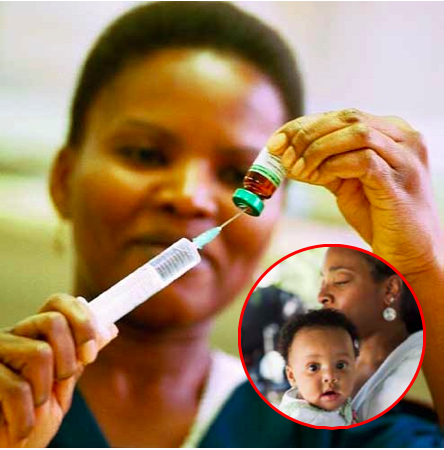 Vaccinations help eliminate diseases that once injured or killed thousands of children. Babies get protection against certain diseases from the antibodies of their mother’s placenta and build up resistance against diseases as they become exposed to them.
Vaccinations help eliminate diseases that once injured or killed thousands of children. Babies get protection against certain diseases from the antibodies of their mother’s placenta and build up resistance against diseases as they become exposed to them.
However, this protection is not enough when it comes to certain diseases and to protect against these, children need to be vaccinated.
One example of the great impact vaccines can have relates to polio - a highly infectious disease caused by a virus that invades the nervous system and can cause total paralysis in a matter of hours.
As a result of the Global Polio Eradication Campaign, “polio cases have decreased by over 99 per cent since 1988, from an estimated 350 000 cases then, to 650 reported cases in 2011”, according the World Health Organization.
What are vaccinations?
Vaccinations are a way of creating immunity by injecting certain weakened diseased bacteria or viruses into the body. The immune system responds by producing antibodies to prevent any future infections of the same disease.
You can have your child vaccinated at your local clinic, paediatrician or community health centre. Vaccinations are free of charge.
When you take your child to a clinic or paediatrician for vaccinations take your Road-to-Health Chart with you. This will be given to you when your baby goes for his or her first immunisation. All of the baby's health details are recorded on this chart such as birth weight, height and the vaccinations the baby has had.
Keep the chart in a safe place, as you will need it when your child goes to primary school.
Are there side effects?
“Vaccines will involve some discomfort and may cause pain, redness, or tenderness at the site of injection but this is minimal compared to the pain, discomfort, and trauma of the diseases these vaccines prevent,” according to the Centers for Disease Control and Prevention.
The area where the injection has been ad- ministered may bleed slightly. Should this happen dab on petroleum jelly to prevent bleeding and soothe the area.
If your child shows severe signs and symptoms of fever, convulsions or allergic reaction consult your doctor immediately.
Types of vaccines
|
Age of child |
Vacccine needed |
How and where is it given? |
|
At birth |
BCG Bacillies Calmette Guerin |
Right arm |
|
OPV (O) Oral Polio Vaccine |
Drops by mouth |
|
|
6 weeks |
OPV (1) Oral Polio Vaccine |
Drops by mouth |
|
|
RV (1) Rotavirus Vaccine |
Liquid by mouth |
|
|
DTap-IPV/Hib (1) Diphtheria, Tetanus, acellular Pertussis, inactivated Polio Vaccine and Haemophilus influenzae type b combined |
Intramuscular/Left thigh |
|
|
Heb B (1) Hepatitis BVaccine |
Intramuscular/Right thigh |
|
|
PCV7 (1) Pneumococcal Conjugated Vaccine |
Intramuscular/Right thigh |
|
10 weeks |
DTap-IPV//Hib (2) Diphtheria, Tetanus, acellular Pertussis, Inactivated Polio Vaccine and Haemophilus influenzae type b combined |
Intramuscular/Left thigh |
|
|
Heb B (2) Hepatitis BVaccine |
Intramuscular/Right thigh |
|
14 weeks |
RV (2) Rotavirus Vaccine* |
Liquid by mouth |
|
|
DTap-IPV//Hib (3) Diphtheria, Tetanus, acellular Pertussis, Inactivated Polio Vaccine and Haemophilus influenzae type b combined |
Intramuscular/Left thigh |
|
|
Heb B (3) Hepatitis BVaccine |
Intramuscular/Right thigh |
|
|
PCV7 (2) Pneumococcal Conjugated Vaccine |
Intramuscular/Right thigh |
|
9 months |
Measles Vaccine (1) |
Intramuscular/Left thigh |
|
|
PCV7 (3) Pneumococcal Conjugated Vaccine |
Intramuscular/Right thigh |
|
18 months |
DTap-IPV//Hib (4) Diphtheria, Tetanus, acellular Pertussis, Inactivated Polio Vaccine and Haemophilus influenzae type b combined |
Intramuscular/Left thigh |
|
|
Measles Vaccine (2) |
Intramuscular/Right arm |
|
6 years (Both boys and girls) |
Td Vaccine Tetanus and reduced strength of diphtheria Vaccine |
Intramuscular/left arm |
|
12 years (Both boys and girls) |
Td Vaccine Tetanus and reduced strength of diphtheria Vaccine |
Intramuscular/left arm |
* Rotavirus Vaccine should NOT be administered after 24 weeks Source: Department of Health
References
Centers for Disease Control and Prevention: http://www.cdc.gov/media/subtopic/matte/pdf/ CDCFiveReasonstoVaccinateYourChild.pdf
KidsHealth: http://kidshealth.org/parent/infections/immunizations/vaccine.html
World Health Organization: http://www.who.int/ mediacentre/factsheets/fs114/en/
Gauteng residents speak their mind
Gauteng residents speak their mind sadminGauteng residents had the opportunity to raise their concerns with members of the National Council of Provinces (NCOP) recently, when they visited the province to assess service delivery.
For those living in Lufhereng, a residential development in Soweto, it was an opportunity to tell the NCOP about the high crime rate and violence against women and children they encountered, as well as their need for more housing.
The Gauteng Provincial Legislature’s deputy chairperson of committees, Valentine Mbatha, assured residents that the provincial government was doing everything in its power to address their service delivery issues.
The visit by NCOP members took place under the theme, Moving with utmost speed to ensure socio-economic advancement in our communities.
The aim of the Provincial Week was to allow members of the NCOP to interact with the people of the province and municipalities to assess service delivery and to obtain new mandates on issues to be placed on the national agenda.
Premier Nomvula Mokonyane pledged that the provincial government would speed up efforts to build economic infra- structure.
Addressing delegates at the Gauteng Provincial Legislature, Premier Mokonyane said the focus of the week would be trans- port and related flagship projects including freight and logistics hubs at City Deep/ Kaserne and the OR Tambo International Airport.
Destinations visited during the week were those that showcased housing development and economic infrastructure such as the Lufhereng community, the Protea Glen Mall, Zola Jabulani Hospital and the Soweto Theatre.
Apart from hearing from communities, NCOP members also got to experience the public transport infrastructure first hand, on board the Rea Vaya Bus Rapid Transit bus.
Their first stop was the 30 000 square metre Protea Glen Mall, which boasts over 90 stores. The mall, built just over a year ago, has created employment opportunities for 900 people, including 660 for local residents.
Plans are also underway to extend the mall, a process which will lead to more employment opportunities.
“We came here as part of conducting oversight on economic development projects. This is part of service delivery that we are witnessing now,” said the leader of the NCOP delegation, Pinkie Mncube.
The site visit then moved to the new Zola Jabulani Hospital and the Soweto Theatre, which opened in May 2012.
During construction, 429 jobs were created, with about 250 of these for locals.
Other follow up visits to service delivery sites in Wadeville, Nigel Springs, Ramaphosa and Eden Park saw NCOP members assess the state of clinics and hospitals, police stations, courts and correctional services.
The visits also monitored progress made on issues such as road infrastructure, healthcare, ambulance services, corruption, nepotism, crime, domestic violence, rape, job creation and security in schools.
Advice line all ears to SA’s legal woes
Advice line all ears to SA’s legal woes sadminSouth Africa is set for a massive boost in science with the recent announcement that the country – together with eight African partner nations – will host the majority of the Square Kilometre Array (SKA) telescope project.
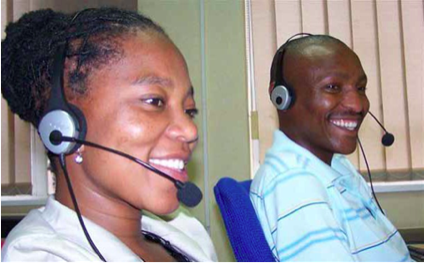 The call centre, which currently has a staff complement of four qualified attorneys and 18 paralegals, has been instrumental in ensuring that the poor and those living in rural areas are able to get legal advice.
The call centre, which currently has a staff complement of four qualified attorneys and 18 paralegals, has been instrumental in ensuring that the poor and those living in rural areas are able to get legal advice.
The call centre gives advice on civil, family, labour and criminal matters. Cases that are more complex are referred to Justice Centres for further action and assistance.
Legal Aid SA spokesperson Mpho Phasha said call volumes to the line are expected to increase in the coming years as more people become aware of the service.
“Backed by a consistent public relations and marketing campaign, as well as improved operational efficiencies, we expect the call centre to maintain steady growth for years to come,” he said.
Legal Aid Advice Line manager Andries Nthebe said call centre staff was being adjusted as required to meet the increased demand. “At the moment, we are able to service our clients more efficiently through a centralised call centre, which is open from 7am to 7pm.”
Those who call in outside these times have the option of leaving a message with their telephone number so that they can be called back.
“Should there be a demand for assistance outside normal hours increase, we may have to extend our operations outside normal office hours,” Nthebe added.
He said call centre staff resolved about 70 per cent of calls while the rest were referred to Justice Centres and other institutions.
“The Legal Aid Advice Line has greatly impacted the lives of the poor and vulnerable through the general advice services we offer. We are able to call the clients back and this means a significant reduction in the cost to them,” explained Nthebe.
Clients also save on transport costs as they receive legal advice over the phone.
The Legal Aid Advice Line is primarily an outbound call centre, he added.
“With the launch of our new website www.legal-aid.co.za, we found that rather than seeking information on how to access our services, clients pose the actual legal questions they have on the web contact. The call centre staff respond to the questions and make follow-ups with the clients depending on the nature of the assistance required,” Nthebe said.
*Nelisiwe Masina - Legal Aid South Africa
If you need legal help, call the Legal Aid Advice Line on 0800 110 110.
News in brief
News in brief sadminNo easy entry into Botswana
The Botswana government will no longer accept emergency travel documents for routine visits to the country by South African citizens, according to the Department of Home Affairs. The use of emergency travel documents would be limited only to emergency situations, which must be supported by documentary proof. South Africans who want to travel to Botswana must acquire proper travel documents that will enable them to enter Botswana.
More tourists visit SA
Foreign visitors to South Africa increased by 15.1 per cent between 2011 and last year – well above the global increase in foreign arrivals of four per cent. Last year, approximately 9.2 million international tourists visited the country.
“It is because South Africans treat visitors warmly and hospitably that we see such positive results,” said President Jacob Zuma, who announced the figures.
Many of the visitors came from the BRICS bloc of countries, which refers to Brazil, Russia, India and South Africa.
SA stand is the fairest of all
South Africa scooped the Best Stand Award for the second year running at the Zimbabwe International Trade Fair recently.
More than 20 countries participated in the fair, with Italy and Mozambique’s exhibition stands placed second and third, respectively. Trade and Industry Deputy Minister Elizabeth Thabethe received the award from Malawian President Dr Joyce Banda on behalf of the department. Forty-seven South African companies exhibited their goods at the fair.
Debt counselling explained
Debt counselling explained sadmin-
 What is debt counselling?
What is debt counselling?
- Debt counselling is one of the available debt relief measures in South Africa provided for in the National Credit Act.
- This process is intended to assist over-indebted consumers struggling with debt, through budget advice, negotiation with credit providers for reduced payments and restructuring of debts.
-
What is over-indebtedness?
- A consumer is over-indebted if he/she cannot service his/her debts in a timely manner as agreed with the creditors.
- The following are some of the indicators of over-indebtedness:
- You borrow money to pay other debts;
- You use your credit card and overdraft facilities to pay debts; buy food and other necessities;
- You skip payments on some accounts in order to pay others;
- You receive letters of demands and summonses from creditors and/or lawyers;
- You have judgments granted against you.
-
Who can apply for debt counselling?
- Consumers who are struggling to meet their monthly debt obligation qualify to apply for debt review.
- These consumers should have a distributable income, which will be used to offer reduced payments to your creditors.
- Consumers married in community of property will have to both apply for debt counselling.
-
Who performs debt counselling?
- Debt counselling service is offered by debt counsellors registered with the National Credit Regulator (NCR).
- Prior to registration, debt counsellors (DCs) have to successfully complete a debt counsellor training course, satisfy prescribed education, experience or competency requirements and display ability to manage their own finances.
- Consumers can identify debt counsellors by checking the registration certificate which will indicate the debt counsellors name, surname, id number and the registration number as well as a window decal with NCR logo.
- Consumers are welcome to verify eligibility of these debt counsellors with the NCR.
-
Are there any applicable fees?
- The NCR debt counselling fee guideline is obtainable from www.ncr.org.za alternatively through the NCR contact centre.
-
Who is responsible for payment distributions to credit providers?
- The National Credit Regulator has accredited four Payment Distribution Agencies (PDAs) tasked with the collection of consumer monies and distribution of these monies to the creditors.
- We currently have four accredited PDA’s namely, DC Partner, Hyphen Technology (Pty) Ltd, Consumer Protection Excellence and National Payment Distribution Agency.
- Debt Counsellors are prohibited from collecting and distributing debt review funds to creditors.
-
What are the rights and responsibilities of consumers before and after debt counselling application?
- Consumers have a right to apply for debt counselling;
- Consumers have a responsibility to ensure full and correct disclosure at time of application;
- Consumers have a right to be provided with reasons if the application is rejected;
- Consumers have a right to written disclosure of fees applicable on application of debt counselling;
- Consumers have the responsibility to follow up on monthly payments made to the PDAs;
- Consumers have a right to receive distribution statements from their DCs and PDAs on a monthly basis;
- Consumers have a duty to ensure that they understand the process, applicable fees and implications; when in doubt please contact the NCR for verification;
- Consumers have a right to negotiate first with their credit providers and if they fail to reach a consensus, they can approach a debt counsellor; consensus, they can approach a debt counsellor;
-
Tips for consumers on debt management and debt review
- Bad decisions are made during good times, avoid being carried away;
- Be proactive, there is help when the lights indicate danger, do not wait till it’s too late;
- When a demand letter (Section 129) has been issued, the credit agreement will not be included under credit agreement;
- You cannot apply for further credit whilst under debt review;
- Your credit bureau profile will display a debt counselling flag until clearance certificate is issued;
- Do not ignore your creditors, reduced payment is better than nothing at all;
- If your circumstances change, please notify your debt counsellor;
- If you cannot get hold of your DC, please contact NCR immediately for a follow up;
- If things are bad, then it’s time to go on a financial diet;
- If you fail to plan, you are planning to fail; (Always budget and stick to it)
- Where possible, do not borrow, downgrade and cut out those things that you do not need.
- SAVE, SAVE, SAVE, SAVE for rainy days.
Consumers Beware:
- Only make use of registered debt counsellors
- Ensure that all processes and fees are explained upfront (this includes implications and your rights and responsibilities as a consumer)
- Money should not be paid to debt counsellors
- Money should be distributed through a PDA
- Legal fees can be negotiated.
Letters to the Editor – Give us a piece of your mind
Letters to the Editor – Give us a piece of your mind sadmin Hard work pays off
Hard work pays off
People need to realise that if you want to improve your life you need to be willing to work hard.
You have to give yourself enough time to accomplish your goals and if you fail the first time – try again.
Anything can be achieved through hard work, passion and a love for what you do.
Many youth expect to earn a lot of money when they first start working and think that they are entitled to a big salary just because they are going to work everyday.
This expectation is wrong and the youth need to realise that nothing comes without hard work.
Some young people are not willing to work if they are not getting a big amount of money in return.
They say to get the top of the tree you must start at the roots. Young people need to learn to aim higher and work harder.
– Ramoroka Salome from Ga-mushi village, Limpopo.
Victims of crime
It’s very sad when you hear that someone has been brutally raped or murdered. What can we do? We are living in the last days.
We must be there to support each other and pray for our children. Children need to obey their parents and stay away from bad friends who drink alcohol and use drugs.
We don’t know what will happen in the future. My heart goes to everyone who has been a victim of crime.
– Charles Pietersen from Heidelberg, Western Cape.
We would like to hear from you
If any of the information published in Vuk’uzenzele has helped you in any way to improve your life, we would like to hear from you. Don’t forget to include your telephone or cellphone number and address.

http://www.facebook.com/pages/Vukuzenzele/171911042918437
Like us on Facebook to make comments
Send your letters to:
Vuk’uzenzele, Private bag X745, Pretoria, 0001.
E-mail: vukuzenzele@gcis.gov.za.
If you don’t want your real name published you may use a different name, but please include your real name and address.
PLEASE NOTE: To win a prize you must include a physical address and a contact telephone number.
SAFA joins fight against women, children abuse
SAFA joins fight against women, children abuse sadminThe South African Football Association (SAFA) has teamed up with government to fight violence against women and children in the country.
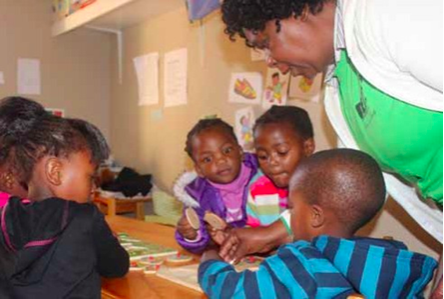 Minister of Women, Children and People with Disabilities Lulu Xingwana recently met SAFA’s president Kirsten Nematandani as part of government’s commitment to mobilise different sectors of society to reduce gender-based violence. Minister Xingwana said she was pleased that SAFA was among the ambassadors of the campaign.
Minister of Women, Children and People with Disabilities Lulu Xingwana recently met SAFA’s president Kirsten Nematandani as part of government’s commitment to mobilise different sectors of society to reduce gender-based violence. Minister Xingwana said she was pleased that SAFA was among the ambassadors of the campaign.
“Football is a powerful communication tool that speaks all languages and reaches every South African. We applaud SAFA for being part of this initiative and urge other organisations to emulate this noble example,” she added.
Having hosted a successful FIFA World Cup in 2010, SAFA is well placed to unite people and could be an effective vehicle in the campaign to reduce the ongoing brutality against women and children.
Nematandani believes that the initiative will bear fruit since South Africa is a football- loving nation.
“To win the war against gender-based violence requires the active involvement of all South Africans. SAFA is privileged to be part of a campaign that seeks to create a society free of violence against women. We want to use soccer, as the number one sport in the country and with its mass appeal, to spread the word.”
Minister Xingwana and Nematandani expressed confidence that through the partnership, communities and the football fraternity would be mobilised to join in the national effort to create a safe and secure environment for women and children.
More details on the partnership are expected to be released soon.
Smart card IDs to be introduced in July
Smart card IDs to be introduced in July sadminThe long-awaited smart identity document (ID) card will be issued to South Africans from July.
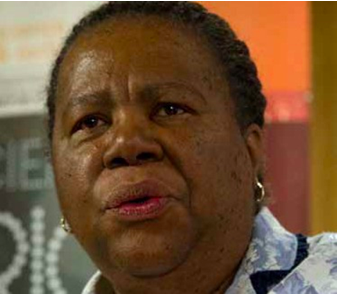 Home Affairs Minister Naledi Pandor made the announcement during her department’s budget vote in Cape Town recently.
Home Affairs Minister Naledi Pandor made the announcement during her department’s budget vote in Cape Town recently.
She said the smart card IDs would first be issued to all first-time ID and re-issue applicants.
The smart cards will initially be introduced at 27 Home Affairs offices across the country - three offices in each province.
This is part of the process of the department moving towards a “paperless environment”.
The new smart ID card will have a microchip, the specifications for which cannot be disclosed for security reasons. The chip will house the necessary biometric data unique to every individual. The information on the chip will be laser-engraved to prevent tampering.
“It is a contactless card containing a microchip embedded with biometric security features. It has a life span of at least 10 years,” said Minister Pandor.
The smart cards aim to cut down on the fraudulent use of fake or stolen IDs. The Minister added that the new cards would be almost impossible to forge.
The cost of the smart ID card will be the same as the amount paid for the green bar-coded ID, which currently costs about R140. IDs are free for first time applicants.
She added that it would take about three days for an applicant to receive the smart card.
“Over the next three years, we will install live capture in all our offices. This will enable the department to issue smart ID cards to all South African citizens over the next five to seven years and to finally get rid of the green ID book.”
People in possession of the new IDs will be able to use them for next year’s general elections.
Minister Pandor said it would take the department seven to eight years to do away with the old IDs.
For more information contact the Department of Home Affairs on 0800 601 190.
African issues in the spotlight
African issues in the spotlight sadminAfrica had to get to the stage where it was self- sufficient and could use its own resources to fund its development needs, says President Jacob Zuma.
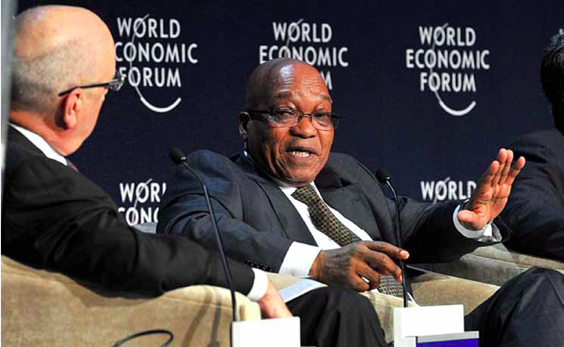 Addressing the World Economic Forum (WEF) on Africa in Cape Town recently, the President said the continent also needed to reach a point where it was able to trade with the world on equal terms.
Addressing the World Economic Forum (WEF) on Africa in Cape Town recently, the President said the continent also needed to reach a point where it was able to trade with the world on equal terms.
However, President Zuma also noted that Africa’s attitude towards itself and how it interacts with the world had changed for the better.
Fifty years after the setting up of the Organisation for Africa Unity (OAU) - now known as the African Union - the continent stood at a precipice, he added.
“If you take the 50 years since it was established, we are almost at a point of launching Africa into very great activities to achieve a prosperous continent.”
However, conflicts in Africa still stood in the way of development and it was for this reason that South Africa and its fellow African states were working hard to rid the continent of conflict.
“I think African leaders are saying, for the first time, ‘Let us organise ourselves and let us talk to the kind of organisations that will respond positively and very effectively on what we think needs to be done to develop our continent’.”
The President said South Africa’s BRICS membership represented an important turning point for Africa’s connectivity to the globe.
Referring to the BRICS (Brazil, Russia, India, China and South Africa) Summit that took place in Durban recently, President Zuma said: “I think the BRICS leadership found it very pleasing that Africa could say, ‘Here are specific projects that Africa is presenting to investors’”.
“Our belief is that the membership of South Africa to BRICS represents the one-billion people on the continent of Africa.”
He added that the BRICS Development Bank would soon become a reality and that finance
ministers from the five member countries were currently working on the technical details around setting up the bank.
The two main issues that finance ministers were addressing was how BRICS members would capitalise the bank and secondly, where to base the development bank.
President Zuma called for the development bank to be based in Africa, where the greatest need for development funding lay.
African Union Commission chair Nkosazana Dlamini Zuma, who also addressed the forum, said that in the next 50 years, Africa should be described as a prosperous continent that was at peace with itself.
Dlamini Zuma said the key to Africa’s growth would be to invest in its people by improving health, education, skills and in- novation. Investing in agriculture would be key, as agriculture could help create jobs and feed those on the continent.
She pointed out that in promoting growth, the continent should opt for modern techniques, tools and infrastructure. The continent also needed more partnerships between businesses, citizens and governments.
African Development Bank president Donald Kaberuka told the gathering that the continent had to continue developing infrastructure, pointing out that poor infrastructure added about 40 per cent of the cost of doing business on the continent.
Kaberuka said he had spoken with President Zuma about mobilising African resources to fund infrastructure, rather than relying largely on foreign aid, as the African Development Bank currently does, to fund such projects.
SA, Nigeria strengthen relations
SA, Nigeria strengthen relations sadminInternational relations
South Africa and Nigeria have agreed to strengthen their diplomatic, trade and tourism ties.
 Relations between the two African giants have warmed up following state visits, first by President Jacob Zuma to Nigeria in April and then a return visit by Nigeria’s President Goodluck Jonathan to South Africa in May.
Relations between the two African giants have warmed up following state visits, first by President Jacob Zuma to Nigeria in April and then a return visit by Nigeria’s President Goodluck Jonathan to South Africa in May.
The talks resulted in the two countries signing agreements in the areas of defence cooperation, waiver of visas on diplomatic and official passports, cooperation in the legal field, oil and gas, geology, mining and mineral processing, and metallurgy.
The two countries also agreed to cooperate in advancing women and child development, power sector development, field environment, and information and communication technology. Following the agreement to boost tourism links, South Africa will be opening up a tourism office in Lagos.
In January, the South African Institute of Professional Accountants signed a memorandum of understanding with the Council for the Association of National Accountants of Nigeria. This agreement allows South African accountants to work in Nigeria and Nigerian accountants to practise in South Africa.
With a population estimated at over 167 million by its National Population Commission, Nigeria is the most populous country in Africa.
South Africa is the richest country in Africa. But with Nigeria’s annual growth rate for 2013 expected to be 7 per cent, it may outgrow South Africa’s economy as early as next year.
President Zuma said over 100 South African companies are already doing business in Nigeria. Many of these companies have invested in the sectors of communications, engineering, construction, media, banking, retail, hospitality, oil and gas exploration and services, he added.
Addressing the South Africa-Nigeria Business Forum, the President urged South Africans to look to Nigeria for business opportunities. “I would also like to urge Nigerians to take advantage of the trade and investment opportunities that are present in South Africa and what this country has to offer.”
President Jonathan said his country was ready to strengthen the historical ties it has with South Africa. In his first visit to the country, President Jonathan said Nigerians and South Africans forged good relations during the struggle against apartheid.
“The role played by individual nations, including my country Nigeria, in the struggle for the emergence of a new South Africa that is non-racial, independent and democratic is already part of the special linkages between our two countries.”
In his address to the South African Parliament, President Jonathan said that the two countries would play a critical a role in the revival of African economies.
“South Africa and Nigeria, with our robust economies and large markets, are well placed to accelerate the emergence of this renaissance [in] Africa.”
President Jonathan said it was essential that Africa’s two biggest economies work together for the advancement of the continent.
Artists ready to set Grahamstown on fire
Artists ready to set Grahamstown on fire sadminSport, arts and culture
It’s all systems go for the 2013 National Arts Festival in Grahamstown, which takes place in the Eastern Cape town from 27 June to 7 July.
 Over 50 000 people from across the country are expected to descend on the quiet university town to enjoy the festivities, which include street performances, music, dance, theatre, stand up comedy, arts and crafts.
Over 50 000 people from across the country are expected to descend on the quiet university town to enjoy the festivities, which include street performances, music, dance, theatre, stand up comedy, arts and crafts.
Now in its 39th year, the festival has become the biggest attraction on South Africa’s cultural calendar.
The festival’s publicist Gilly Himphell said there would be something for everyone at this year’s festival.
“We don’t have any one main attraction, it’s varied and riveting.”
The festival is sponsored by the Department of Arts and Culture, Eastern Cape government, Standard Bank, National Lottery Distribution Trust Fund, National Arts Council, City Press and M-Net.
Organised by the Grahamstown Foundation, the festival’s programme is divided between the main and fringe performances, with the fringe representing the independent and upcoming artists and performers.
A special guest from the Juilliard School of Music in New York, renowned trombonist and shells specialist Steve Turre, will headline the mainstream performances.
He promises to add zest to the Awesome Big Band and his solo show will be supported by a strong line-up comprising Marcus Wyatt (trumpet), Bokani Dyer (piano), Hein van de Geyn (bass) and Kevin Gibson (drums).
Himphell says that jazz will be a major attraction at the festival.
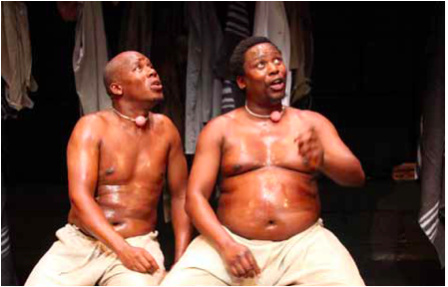
“We have a strong jazz programme. There’ll be musicians from the United States, Norway, Sweden, Holland and other parts of the world.”
Jonas Gwangwa, Gloria Bosman, Vusi Mahlasela and Karen Zoid promise to liven up the Afro-jazz programme. The Soweto String Quartet will be making their first appearance at the Grahamstown jazz stage.
According to Himphell, the Standard Bank National Youth Jazz Band will present a selection of the top young jazz musicians in the country between the ages of 19 and 25, under the musical direction of South African jazz legend, trumpeter Marcus Wyatt.
“The Standard Bank National Schools’ Big Band consists of the top young jazz musicians in the country and performs material worked on over the five days of the Standard Bank National Youth Jazz Festival,” he added.
The festival also has a teaching component, which will see established musicians conducting workshops for youngsters from local communities.
Theatre will also be a major draw card, with some old hands returning to the stage. Among the seasoned performers making their comeback to the stage will be satirist Pieter Dirk Uys with two plays Adapt or Fly and An Audience with Pieter-Dirk EISH and Mbongeni Ngema with the premier of The Zulu.
The Performing Arts Centre of the Free State will present Madonna of Excelsior - adapted by Kobus Moolman from the novel by Zakes Mda, which explores sex between during the apartheid era.
The Market Theatre will also have a strong presence at the festival, featuring classical works such as Woza Albert (directed by Standard Bank Young Artist Prince Lamla), Cadre (directed by Omphilo Molusi), The Island (directed by John Kani), The Line (directed by Gina Shmukler).
Spokesman for the State Theatre Lindelwa Mahlabe says the theatre will be strongly represented with Silent Voice (Aubrey Sekhabi), Rhetorical (Paul Grootboom) and Vampire (Junior Mathibela).
A variety of local and international films, accompanied by seminars, will also be shown. Among films to look out for are Underground: The Julian Assange Story, Bail Out: The Age Of Greed, Meat, The Marat/ Sade, The Magus, Beware of Mr Baker, The War Around Us and The Naked Prey.
Proteas aim high in Champions Trophy
Proteas aim high in Champions Trophy sadminSport, arts and culture
The Proteas will lock horns with the top seven One Day International (ODI) teams this month in the last edition of the International Cricket Council (ICC) Champions Trophy in England and Wales.
 The Proteas will do battle with world champions India, Pakistan and World T20 Champions West Indies in what has been referred to as the group of death.
The Proteas will do battle with world champions India, Pakistan and World T20 Champions West Indies in what has been referred to as the group of death.
The South Africa team is aiming to repeat the performance that saw it win the first tournament held in Bangladesh in 1998.
The Proteas will be without star batsman and former skipper Graeme Smith, who has a stress fracture on his left ankle.
The consistency and depth that is usually provided by number one all-rounder Jacques Kallis will also be missed as he has withdrawn from the tournament for personal reasons.
The Proteas first match, which is also the opening game of the tournament, will be against India at Sophia Gardens, Cardiff (Wales) on 6 June, followed by a showdown against Pakistan at Edgbaston, Birmingham (England) on 10 June.
The team will make the trip back to Sophia Gardens for the last group match against West Indies on 14 June.
If the Proteas progress through the group stage and semi-final they will make an appearance in the final on 23 June.
Proteas’ Group B opponents
 India: The first game of the tournament will be a mouth-watering clash between two countries that have political and historical ties. The Proteas might have some difficulty in beating India given their galaxy of stars, from captain Mahendra Singh Dhoni to Virat Kohli, Rohit Sharma and Suresh Raina, among others.
India: The first game of the tournament will be a mouth-watering clash between two countries that have political and historical ties. The Proteas might have some difficulty in beating India given their galaxy of stars, from captain Mahendra Singh Dhoni to Virat Kohli, Rohit Sharma and Suresh Raina, among others.
 Pakistan: With the firepower of the number one ranked batsman in the ODI rankings and captain AB de Villiers, as well as number two batsman Hashim Amla, the Proteas should not have any trouble disposing of Pakistan like they did in the recent ODI series held on South African soil.
Pakistan: With the firepower of the number one ranked batsman in the ODI rankings and captain AB de Villiers, as well as number two batsman Hashim Amla, the Proteas should not have any trouble disposing of Pakistan like they did in the recent ODI series held on South African soil.
 West Indies: The last group game against the T20 World Champions is likely to decide the fate of the Proteas’ participation in the tournament. The West Indies might be a tough nut to crack given the inclusion of star batsman Chris Gayle who wreaked havoc during the recent Indian Premier League.
West Indies: The last group game against the T20 World Champions is likely to decide the fate of the Proteas’ participation in the tournament. The West Indies might be a tough nut to crack given the inclusion of star batsman Chris Gayle who wreaked havoc during the recent Indian Premier League.